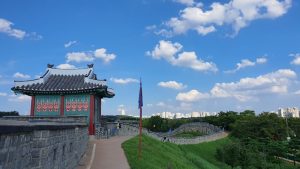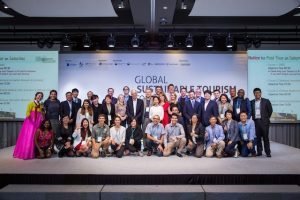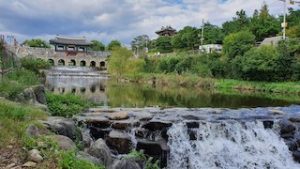Overview of Hwaseong Fortress, Suwon City

Panoramic views from Hwaseong Fortress
Suwon City is known for its Hwaseong Fortress. It was constructed at the end of the 18th Century and was the largest urban planning project after Hanseong (Seoul). It boasts a 5.7 kilometer-long castle wall with elaborate urban infrastructure and annexes.
As an UNESCO World Heritage Site, foundations of laws and policies already exist to protect the natural and cultural heritage within the Fortress. Therefore, the recommendations from the GSTC Destination Assessment in Korea strive mostly to strengthen the management systems. This ensures strategic implementation to safeguard the destination from any negative impacts, while still maximizing benefits from tourism.
Details of the GSTC Destination Assessment in Suwon
The GSTC’s Destinations Program Director, Kathleen Pessolano, conducted an onsite assessment of Hwaseong Fortress from October 2nd – 4th, 2016. The project facilitator was Ms. Eun Young Shin, with assistance from Ms. Suhyeon Park, from the Suwon City Tourism Division.
The assessment evaluated the destination’s policies and practices against the GSTC Destination Criteria. Additionally, Dr. Mihee Kang, Consultant to Suwon City Tourism Division, provided expert technical interpretation of Hwaseong Fortress and Suwon Cities’ policies and practices.
Throughout the three days, the GSTC Assessors reviewed key policy documents. They consulted approximately 20 stakeholders across sectors during the evaluation period. Suwon has published and shared their results with stakeholders in order to recognize their challenges. These results will allow for better collaboration towards improving the weak areas, while strengthening their strong sustainability practices.
Objective of the Assessment
Furthermore, the objective of the GSTC Destination Assessment in Korea is to provide the destination an overview of current good practices and risk areas. It’s a demonstration of how to apply the GSTC’s Criteria for Destinations, and a tool for internal use. It allows the destinations to improve their policies and align them with the best international sustainability practices.
The Global Sustainable Tourism Conference

Group photo at the Global Sustainable Tourism Conference
Following the Destination Assessment, participants from the private sector, public sector, NGOs, and academia attended the Global Sustainable Tourism Conference. The Conference took place from October 5-8, 2016, in Suwon City.
Participants joined together to learn and share contemporary ideas on sustainability that can be translated into action. GSTC partnered with Korean hosts to assemble a group of experts on sustainable tourism to network and share leading-edge insights to one another.
Receiving ‘GSTC-Recognized Standard’ Status
Additionally, the Global Sustainable Tourism Council is pleased to announce that the Sustainable City Tourism Destination Standard for the Republic of Korea has achieved ‘GSTC-Recognized’ status. The Sustainable City Tourism Destination Standard for the Republic of Korea is designed to apply the GSTC Criteria as universal principles into the context of cities in South Korea. The Suwon City Tourism Bureau plans to apply the standards first to their own internal sustainability practices, then seek other cities throughout the country to apply the Standard, as well.
Achieving the GSTC-Recognized status means that a sustainable tourism standard has been reviewed by GSTC technical experts and the GSTC Accreditation Panel and deemed equivalent to the GSTC Criteria for sustainable tourism.
Suwon’s Commitment to Sustainable Tourism

Views of Hwaseong Fortress
During the GSTC Destination Assessment in Korea, Mr. Randy Durban, CEO of GSTC noticed that “Suwon’s commitment to sustainable tourism goes far deeper than hosting our recent global conference”.
Furthermore, he says, «The city intends to build upon current practices, which includes management of its UNESCO World Heritage Site, to broaden their tourism offerings and manage it according to established sustainable principles.”
“Suwon has been putting much effort to become a sustainable city, both environmentally and socio-culturally. Now the GSTC Criteria will guide us to achieve sustainability in tourism” says the Mayor of Suwon, Mr. Yeom Taeyoung. “We will encourage other cities to join us to become sustainable tourism destinations, as well. That is what we should do for a better life for both present and future generations. As members of GSTC, we would like to collaborate closely with GSTC and to contribute to a more sustainable world.”
GSTC Recognition of Standards and Accreditation of Certification Schemes
The GSTC will continue to work with organizations around the world to provide GSTC Recognition of standards for sustainability in travel and tourism. They will also provide accreditation of certification schemes that use these standards. GSTC-Recognized standard owners are encouraged to complete the GSTC Accreditation process which assures that the certification process used to apply the standard meets international best practice, transparent, and rigor.
Developing sustainable tourism in Korea:




